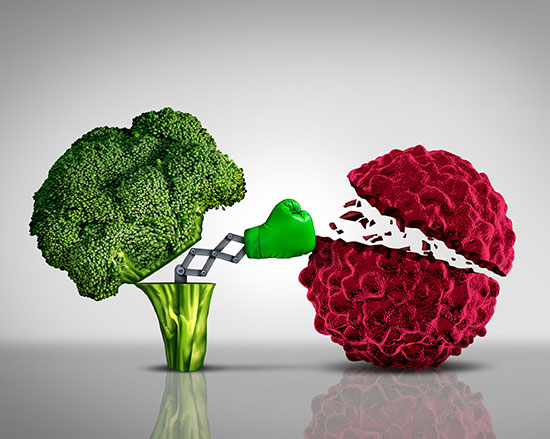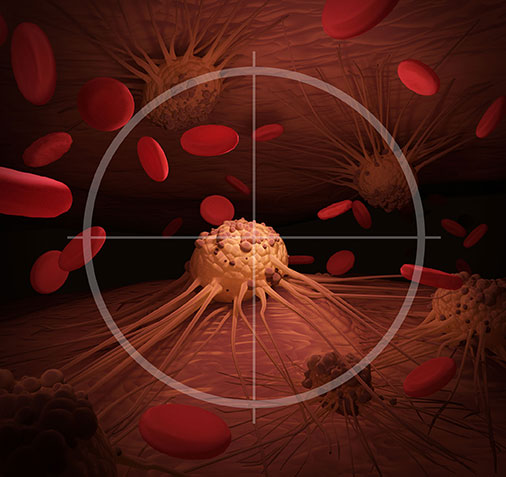The Immune System - part 2
The right nutrition is not the only factor to influence your immune system yourself
This is the second part of our series on the Immune System, started in magazine 19.
As already mentioned in the first part, the immune system not only plays an important role in the defence against infections, but also in the fight against cancer cells.
What are cancer cells?
Everyone has cells in his/her body which can, at any time, through uncontrolled growth or modified function, develop into cancer cells and damage our bodies. Every possible type of cancer can evolve and change the life we have known until then or even clearly shorten life expectancy.
How do cancer cells come into beeing?
Most cancer cells evolve through damage to genetic material or errors in reading genetic information. That leads to changes in the cellular biology, the cells degenerate: cells grow and divide unchecked when they actually shouldn’t and don’t die off when they normally should have. They can lose their normal function and leave their natural position in the body tissue.
What causes such errors and damage?
Certain factors can cause cancer or at least promote it. Alcohol, smoking, being overweight, a lack of exercise, diet, chronic infections, as well as influences through the aging process (increase of errors, e.g. in automatic repair mechanisms) are factors which also play an important role in the formation of cancer. Furthermore, some chemical substances, rays or also pathogens (bacteria, viruses) aid the formation of cancer.
These cancer triggers usually effect errors on or in the genetic material of the cells. Some people may have inherited genetic alterations from their parents for the development of cancer, which could pose an increased risk. Chance could also play a part: Cell division can lead to errors in genetic information without the influence of recognisable and external risk factors.
Normal cell metabolism also produces substances that cause damage to genetic material. In individual people, it is practically impossible to determine exactly what caused the cancer. On the other hand, not everyone who is exposed to known risk factors automatically contracts cancer.
Which types tumors are there?
Depending on their origin, there are so-called "solid" tumours which originate from a tissue group and have a clear limitation (carcinomas, sarcomas and blastomas). The so-called "systemic" cancers affect the entire body, such as malignant diseases of the immune system (lymphomas, leukaemia).
The immune system faces a difficult task in recognising tumour cells: cancer cells are not "foreign invaders", but the body's own cells and should therefore normally not be attacked.
Compared to healthy cells, however, tumour cells carry more or less large changes on the cell surface, the so-called "tumour antigens". Therefore, the immune system is actually able to recognize and destroy such "diseased" cells. This happens regularly in healthy people - without anyone noticing.
How does that work?
In particular the T-cells, and especially the cytotoxic and regulatory T-cell subgroups are the main actors in the fight against cancer. They must, on the one hand, be able to distinguish between "foreign + self" and, on the other hand, between "healthy + degenerated".
The body’s own structures are recognized by the immune system through the presence of a protein complex on the cell surface: the so-called “major histocompatibility complex” (MHC). The dendritic cells present the foreign antigens, or in our case the tumour-specific antigens to the T-cells in such a way that they are activated – similar to the fight against foreign invaders.
In order not to accidentally destroy a healthy cell, the T-cells need two further conditions for the final destruction of the cancer cells: The tumour antigen must be presented together with the MHC complex and so-called "co-stimulatory" (jointly stimulating) surface molecules must also be activated. If the tumour cell lacks the MHC complex or the co-stimulatory factors, then the tumour cell becomes invisible to the T-cell and escapes attack. The B-cells provide a further boost to the immune response by producing specific antibodies that mark the tumour and thus make it more visible more quickly to other immune cells. The non-specific, innate immune system, e.g. with the natural killer cells, is also involved.
All in all, the immune system fights against cancer in a very complex way and there are many safety checks to prevent errors. Unfortunately, the cancer cells exploit this and develop strategies to avoid an immune response, e.g. by making themselves "invisible" to the immune system (no release of tumour antigen, no MHC complex); or by inhibiting the immune reaction (no co-stimulatory signals) so that they can escape the immune system’s defences. Of course, this is a problem, and is precisely what many new research approaches in cancer treatment are aimed at: Immunotherapy. More in the next magazine, part 3.
Important if you're affected: The immune system has not "failed" across the board when cancer develops. Nor is it necessarily too weak to fight the tumour. Therefore, in the vast majority of cases, it is neither necessary nor possible to stimulate the immune system randomly to fight cancer. However, there are exceptions such as special treatments (chemotherapy, transplantation) or diseases (immunodeficiencies, some chronic diseases) that lead to a significantly reduced performance of the immune system. After consultation with the treating physician, so-called "immune stimulants" and other measures can be useful.
Therefore, in my opinion there’s no point in asking the question: why do I have cancer and how did I get it? There are many contributing factors to cancer and everyone can get it. We know of people who smoked or drank excessively and didn’t get cancer. In the same way there are people who didn’t smoke or drink and still got cancer. We shouldn’t speak here of guilt, but of fate.
Can you influence your immune system yourself?
The immune system is also dependent on the body‘s general health, especially on a balanced diet full of vitamins. If, for example, someone is severely malnourished then this person’s body doesn’t have enough resources at its disposal for an adequate immune response so, for example, protein to make lots of immune cells, antibodies and immune mediators. Studies also show that sufficient sleep and exercise can influence the immune system in a positive manner.
The immune system is closely related to the person’s mental condition; stress, anxiety and depression limit the immune response and increase the susceptibility to infections. Positive moods and feelings therefore have a beneficial effect on the immune system. Avoid or at least limit the generally known carcinogenic cancer risk factors such as smoking, alcohol, unbalanced diet, lack of exercise, etc. These and other precautionary measures are all the more important in the case of family predisposition, but also apply to all of us: Let us live: healthy and happy!
Katharina Stang / Mechthild Maiß
Sources:
Krebsinformationsdienst, Deutsches Krebsforschungszentrum: www.krebsinformationsdienst.de
Buch „Krieg in unserem Körper“ von Gabriele Kautzmann






